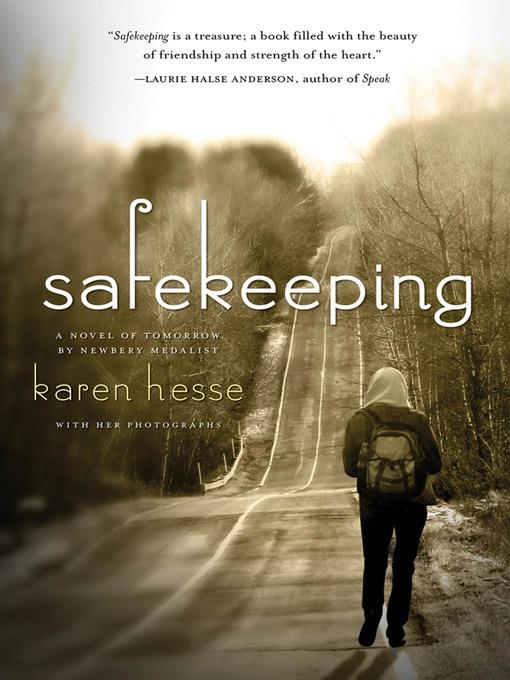
Safekeeping
فرمت کتاب
ebook
تاریخ انتشار
2012
Lexile Score
720
Reading Level
3
ATOS
4.7
Interest Level
6-12(MG+)
نویسنده
Karen Hesseناشر
Feiwel & Friendsشابک
9781466827523
کتاب های مرتبط
- اطلاعات
- نقد و بررسی
- دیدگاه کاربران
نقد و بررسی

August 6, 2012
Hesse (Brooklyn Bridge) beautifully captures the changing landscape of a journey, the wonder of discovery, and a fight to survive in a near-future novel set in the aftermath of a presidential assassination. A group of rebels called the American People’s Party has taken control, and prisons are overcrowded with those they’ve arrested. Radley, an American teenager returning home from doing volunteer work in Haiti, finds her parents gone and her Vermont home abandoned. Not knowing whom to trust or where she’ll be safe, she sets out on foot to Canada, befriending a reticent girl along the way. The two form a tentative friendship and manage to cross into Canada, where they begin a new, primitive life, relying on their wits and small acts of kindness from strangers. The first-person narrative (reflected a shade too obtrusively in Hesse’s 50 b&w photographs) intimately depicts Radley’s loneliness, her longing to regain what she’s taken for granted, and her delight in rediscovering simple pleasures, like eating a hot meal. Hesse’s story is a reminder of how compassion emerges during even the worst of times. Ages 14–up.

September 1, 2012
Billed as "a novel of tomorrow," this account of a privileged teenager who returns from a goodwill trip in Haiti to a changed America disappoints. In the aftermath of a presidential assassination, the American People's Party has taken over the government, enforcing strict new security measures. Without food or cash and unable to reach her parents, Radley finally arrives in Brattleboro, Vt., to find her home empty. Holding out hope that she'll rejoin her parents, Radley heads off to Quebec on foot. She meets a taciturn girl named Celia, and the two cross the border together. They settle into an abandoned schoolhouse, relying on a benefactor Radley dubs "Our Lady of the Barn." The sinister political backdrop gets short shrift, as the storyline plays out like a tone poem, with the bulk of the novel built around the author's photographs of the countryside. Implausibilities interrupt the placid pacing of the prose: Radley's methodical search of the house before getting food from the pantry, despite days of starvation; her utter reluctance to communicate with others out of paranoia that she'll be arrested; restaurant Dumpsters full of food though no one seems to be about. Hesse offers some of her best in lavish descriptions of nature and mood, all overlaid with a social message, but this might be of more interest to adults than to teens. (Speculative fiction. 14 & up)
COPYRIGHT(2012) Kirkus Reviews, ALL RIGHTS RESERVED.

Starred review from August 1, 2012
Gr 7 Up-Radley Parker-Hughes has been volunteering in an orphanage in Haiti after the recent earthquake, but she returns home to a country in the grip of an even more chaotic situation. The American Political Party has assumed power, the president has been assassinated, and martial law prevails. Soldiers with guns at the airport, travel paper requirements-is this really the New Hampshire she left just a few months ago? And where are her parents, who are usually so prompt picking her up at the airport? Radley decides to get home any way she can, even though she will have to cross states lines, strictly forbidden by the new government. When she arrives, her parents are nowhere to be found, but the police are. She decides to leave, hiding in the woods at night, making her way to Canada, assuming that's where her parents went. One day she encounters an obviously ill young woman who is also trying to escape. The two form an uneasy alliance and, along with Celia's dog, Jerry Lee, they slip across the border. An abandoned shack becomes home, and through the kindness of strangers, they survive and become close. Once the chaos in the U.S. subsides, Radley makes her way back home, only to find that things will never be the same. A journey back to Canada can't soothe her pain, but a return to Haiti does. And so her story comes full circle. The prose is exquisite, almost poetic. The simple beauty of the narrative and lovely black-and-white photographs actually intensify the sense of confusion and disorder, giving readers a chilling feeling of reality. They see, through the use of flashbacks interspersed in the story line, how Radley grows from a confused, scared teen into a confident young woman, able to handle her own life. A masterfully written powerhouse of a book.-Diana Pierce, Leander High School, TX
Copyright 2012 School Library Journal, LLC Used with permission.

August 1, 2012
Grades 8-11 From Hesse, author of Newbery-winner Out of the Dust (1997), comes a dystopia seen from the outer fringe. In the near future, Radley, 17, is working in Haiti when the president of the U.S. is assassinated, prompting the American People's Party to take into custody scores of dissenters. Radley returns home amid martial law to find her parents missing, and so she takes to the road and wilderness to cross over into the safe zone of Canada. Along the way, she meets Celia, an emotionally wounded teen with whom she begins to forge a powerful bond. Though the backstory is fascinating, Hesse chooses (rather bravely) to focus entirely on the quiet conversations and tentative personal progress of the girls as they raid Dumpsters and establish a home in the woods. Chapters become short, like journal entries, and to accommodate the lack of incident, 50 photographs are spread throughout the text. Unfortunately, these serene nature shots add little punch to the already placid narrative, resulting in a final product that feels well intended but never quite blossoms.(Reprinted with permission of Booklist, copyright 2012, American Library Association.)

























دیدگاه کاربران